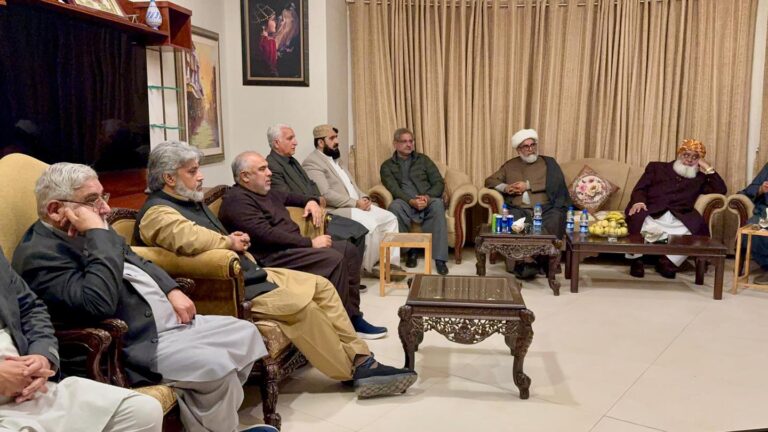ISLAMABAD: A high-profile meeting of opposition political parties leaders was held at the residence of former National Assembly Speaker Asad Qaiser in which they demanded new elections and an end to the imposed government.
The opposition leaders also include former Prime Minister Shahid Khaqan Abbasi and Jamiat Ulema-e-Islam (JUI-F) chief Maulana Fazlur Rehman gathered to discuss Pakistan’s current political situation and allegations of election rigging.
Among those in attendance were Pashtoonkhwa Milli Awami Party (PkMAP) chief Mehmood Khan Achakzai, along with Mustafa Nawaz Khokhar, Omar Ayub, Shibli Faraz, and representatives from the Pakistan Tehreek-e-Insaf (PTI), including senior leader Asad Qaiser. Prominent Shia cleric Allama Nasir Abbas was also present.
Talking to the media after the meeting, the opposition alliance strongly condemned the February 8 general elections, calling them “fraudulent” and alleging that the mandate of the people had been “stolen.”
Maulana Fazlur Rehman stated that the elections lacked transparency and fairness, asserting that the current government had “no legitimate right to remain in power.” He called for the resignation of the Election Commission of Pakistan (ECP), questioning its neutrality.
Echoing similar concerns, Shahid Khaqan Abbasi described the present administration as “imposed on the people” and emphasized that fresh elections were the only way to steer the country out of its political and economic crises. He also called for the release of political prisoners and the repeal of controversial laws, including the Prevention of Electronic Crimes Act (PECA).
The opposition leaders agreed to continue their consultations in the coming days, with discussions on forming a broader political alliance against the government. Sources indicated that strategies for a potential united opposition front were also deliberated.
The meeting signals a growing momentum among opposition parties to challenge the legitimacy of the newly elected government, setting the stage for intensified political confrontation in the country.


